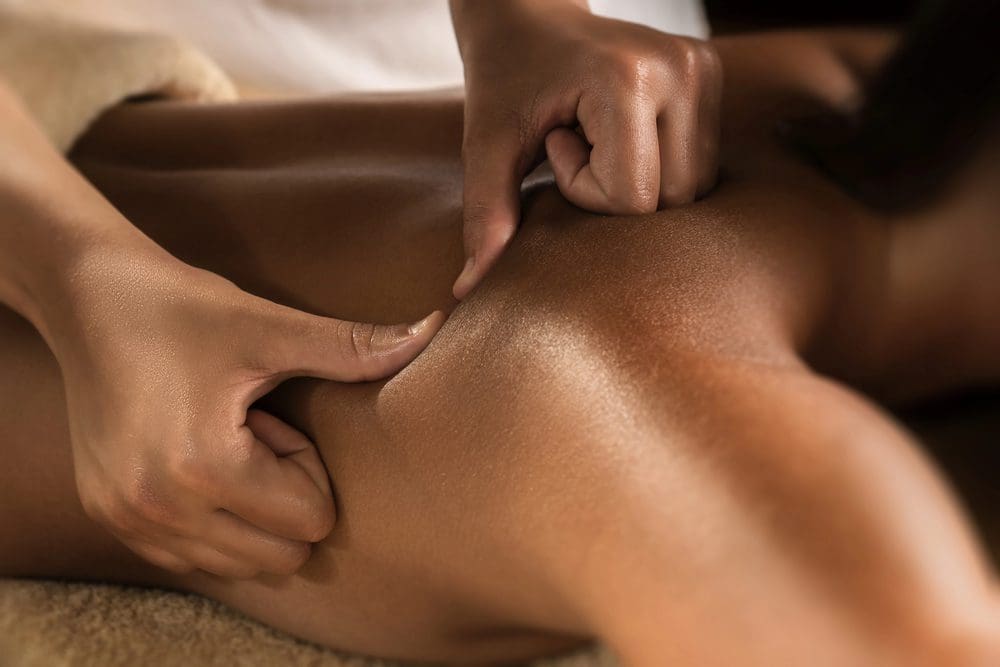Full Disclosure: Clicking on these links could mean a tiny commission for me, at no extra cost to you.
Given how stressful life is for many, anxiety has become an all too common companion in our lives. From the pressures of work to the demands of personal life, it’s easy to become overwhelmed and stressed. Fortunately, amidst this chaos, there exists a soothing remedy that goes beyond mere relaxation – deep tissue massage.
Is Your Stress Trapped in Your Body?
Emotional stress doesn’t just affect your mind — it lives in your body, especially your hips. If you've been feeling tight, restless, or weighed down emotionally, this could be why. Unlock Your Hip Flexors is a mind-body program trusted by wellness professionals that helps you gently release stored tension and emotional buildup from deep within.
Reconnect to your body. Restore your flow. And finally let go of what’s been holding you back.
What is Deep Tissue Massage?
Deep tissue massage is a therapeutic technique that focuses on realigning deeper layers of muscles and connective tissues. Unlike a Swedish massage, which is more about relaxation, deep tissue massage involves slower strokes and deeper pressure to release chronic muscle tension. This massage targets the inner layers of your muscles, tendons, and fascia (the protective layer surrounding muscles, bones, and joints).
For many women, deep tissue massage is not just about physical relief; it’s about restoring balance in both body and mind. The firm pressure and deliberate strokes help to break down knots and adhesions (bands of painful, rigid tissue), which can improve blood flow, reduce inflammation, and promote relaxation on a deeper level.
How Deep Tissue Massage Helps Relieve Anxiety
Anxiety often manifests physically through muscle tension, headaches, and sleep disturbances. Deep tissue massage directly addresses these symptoms by focusing on the deeper muscles that store stress and tension. Here’s how it works:
- Tension Release: By working through the layers of muscle, deep tissue massage helps release built-up tension, which is often associated with chronic anxiety.
- Improved Circulation: This type of massage increases blood flow, which can help reduce the physiological symptoms of anxiety, such as heart palpitations and a racing mind.
- Lowered Stress Hormones: Massage therapy has been shown to decrease cortisol levels in the body. Cortisol is a hormone that plays a key role in stress response. Lower cortisol levels mean a calmer mind and body.
- Endorphin Boost: Deep tissue massage can stimulate the production of endorphins, which are the body’s natural mood boosters. This helps in combating anxiety and improving mental health.
The Science Behind Deep Tissue Massage and Mental Health
Numerous studies support the idea that massage therapy, particularly deep tissue massage, can significantly reduce symptoms of anxiety and improve mental health. For example, research published in the Journal of Clinical Psychiatry found that participants who received regular deep tissue massages reported lower levels of anxiety and depression 1.
Another study conducted by the American Psychological Association highlighted that massage therapy reduces the body’s cortisol levels while boosting serotonin and dopamine, neurotransmitters that play a critical role in mood regulation 2. These findings are particularly relevant for women who experience anxiety, as hormonal fluctuations can often exacerbate anxiety symptoms.
Deep Tissue Massage Techniques
There are several techniques within deep tissue massage that therapists may use to alleviate anxiety:
- Stripping: This involves deep, gliding pressure along the length of the muscle fibers. It’s particularly effective in releasing tension from large muscle groups like the back and legs.
- Friction: This technique involves applying pressure across the grain of the muscle to break down adhesions and improve flexibility. It’s useful for targeting specific areas of chronic tension, such as the neck and shoulders.
- Trigger Point Therapy: Focuses on tight areas within muscle tissue that cause pain in other parts of the body (referred pain). Releasing these points can reduce anxiety-related muscle pain.
By combining these techniques, a skilled therapist can adjust the massage to your specific needs, ensuring both physical and mental benefits.
Benefits of Deep Tissue Massage for Anxiety and Stress
A deep tissue massage is a therapeutic technique that targets the deeper layers of muscles and connective tissues in the body. Unlike traditional massage techniques, which focus on relaxation and superficial muscles, this type of massage applies sustained pressure to release tension and adhesions in the deeper muscle layers. This technique can be beneficial for relieving chronic muscle tension, reducing pain, improving mobility, and promoting overall relaxation and well-being. As such, it is often recommended for anyone with chronic pain conditions, injuries, or those seeking relief from muscular discomfort.
What may surprise you though is that it can also help with anxiety relief as well. Let’s delve into a few ways this deep type of massage therapy can provide relief for those battling anxiety.
Release of Tension and Stress
As told by the Mental Health Foundation, at the core of anxiety lies tension, both physical and mental. One’s physical as well as mental tension can lead one to feel more anxious. Deep tissue massage targets this tension by accessing the deeper layers of muscle tissue, where chronic stress often manifests.
According to Mantis Massage, through firm pressure and slow strokes, a skilled massage therapist can coax muscles to release built-up tension, providing profound relief. As the knots and tightness dissolve, so too can the accompanying feelings of anxiety. This leaves the individual with a sense of lightness and ease.
Unfortunately, you might have some difficulty finding a deep tissue massage facilities in your area. For example, there’s a growing need for therapists who provide deep tissue massage in Austin. So, depending on your location, you may need to wait or explore other areas.
Promotion of Relaxation
Many people these days find themselves stuck in a perpetual state of fight-or-flight. As a result, their sympathetic nervous systems are constantly on high alert. Deep tissue massage acts as a powerful antidote to this physiological response, triggering the parasympathetic nervous system – the body’s natural relaxation mechanism. As the massage progresses, heart rate slows, breathing deepens, and cortisol levels decrease, paving the way for a profound sense of calm. This calm can help clients take on bigger mental health challenges like depression.
As discussed earlier, there’s a growing need for deep tissue massage in Austin and other parts of the US where anxiety levels are high. Deep tissue massage therapists don’t just help relieve anxiety; they also help establish an inner calm in their clients. With the best deep tissue massage therapists on the job, this calm can help clients take on bigger mental health challenges like depression.
Enhanced Blood Circulation
According to Medical News Today, anxiety often goes hand in hand with poor circulation, as constricted blood vessels exacerbate feelings of tension and unease. Deep tissue massage works wonders in this regard, as the targeted pressure applied to muscles and connective tissues promotes the widening of blood vessels.
This allows for improved blood flow throughout the body, delivering vital nutrients and oxygen to tissues while simultaneously flushing out metabolic waste. With circulation optimized, the body is better equipped to maintain a state of balance, reducing the physiological triggers of anxiety.
Improved Sleep Quality
Anxiety can easily disrupt sleep patterns and leave individuals feeling exhausted and depleted. In fact, according to the Sleep Foundation, persistent sleep disruptions, such as insomnia, have been widely acknowledged as a prevalent manifestation of anxiety disorders. Individuals burdened by apprehension frequently dwell on their worries while in bed, and this nocturnal anxiety can hinder their ability to initiate sleep.
Deep massages can be a valuable tool in breaking this cycle. It promotes relaxation and reduces the physical manifestations of stress that can interfere with sleep. Such massage therapy sets the stage for restorative sleep, allowing the body and mind to rejuvenate and recharge.
Sleep Better Naturally with Mushroom Supplements
Discover the calming power of mushroom supplements and experience deeper, more restful sleep. Support your mental well-being with our premium, all-natural formulas. Get 25% off your first order.
Choosing the Right Massage Therapist
Selecting a qualified and experienced therapist is crucial, especially for deep tissue massage, where technique is everything. Here’s what to look for:
- Credentials: Ensure the therapist is licensed and has specific training in deep tissue massage.
- Experience: Look for a therapist who has experience working with women, particularly those dealing with anxiety and stress-related issues.
- Personal Comfort: It’s essential to feel comfortable with your therapist. Don’t hesitate to ask questions about their approach and to express any concerns you may have.
Incorporating Deep Tissue Massage into a Self-Care Routine
Deep tissue massage can be an integral part of your self-care routine. Here’s how to make the most of it:
- Regular Appointments: Consider scheduling regular massages—whether weekly, bi-weekly, or monthly—to maintain the benefits.
- Post-Massage Care: After your session, hydrate well and take it easy to allow your body to fully integrate the effects of the massage.
- Complementary Practices: Combine massage with other self-care practices like yoga, meditation, or mindfulness exercises to enhance the benefits.
Combining Deep Tissue Massage with Other Therapies
Maximize the benefits of deep tissue massage by integrating it with other therapies:
- Aromatherapy: Using essential oils like lavender or chamomile during your massage can deepen relaxation and enhance anxiety relief.
- Yoga: Yoga can help maintain the muscle flexibility and tension relief gained from deep tissue massage. Our readers get 50% off their online yoga membership here.
- Meditation: Practicing meditation can extend the mental calmness achieved during the massage.
How Often Should You Get a Deep Tissue Massage?
The frequency of your massages depends on your individual needs and goals:
- For Anxiety Relief: Weekly or bi-weekly sessions can be beneficial for managing chronic anxiety.
- For Maintenance: A monthly massage may be sufficient if you’re looking to maintain overall mental health and well-being.
- For Acute Stress: During particularly stressful periods, you might consider more frequent sessions, as recommended by your therapist.
Final Thoughts on Deep Tissue Massage for Anxiety
Deep tissue massage offers a dynamic approach to combating anxiety, addressing both the physical and emotional components of this complex condition. By promoting a deeper connection between body and mind, this type of massage empowers you to reclaim a sense of tranquility in your life.
Frequently Asked Questions (FAQs)
- What is deep tissue massage for?
Deep tissue massage is mainly used to address musculoskeletal issues such as strains and sports injuries. It targets the inner layers of muscles and connective tissues for therapeutic relief through sustained pressure and deep strokes.
- What happens when you go for a deep tissue massage?
Throughout the massage session, you’ll typically recline on a massage table as the therapist administers sustained pressure and deep strokes to targeted areas of your body. While this may occasionally induce discomfort, it’s often succeeded by a sense of relief as tension is gradually alleviated, leaving you feeling more relaxed.
- Is a deep tissue massage painful?
Deep tissue massage may induce discomfort or mild pain, particularly if you have tense or tight areas. However, the degree of discomfort varies widely among individuals and hinges on factors like pain tolerance and the therapist’s expertise. Openly communicating your comfort level with your therapist can enhance the overall effectiveness of the session.
References:- Rapaport, M. H., Schettler, P., Bresee, C., & Markowitz, J. (2016). A randomized trial of Swedish massage for generalized anxiety disorder. Journal of Clinical Psychiatry, 77(7), 883-890. https://doi.org/10.4088/JCP.15m10161
- Field, T., Hernandez-Reif, M., Diego, M., Schanberg, S., & Kuhn, C. (2005). Cortisol decreases and serotonin and dopamine increase following massage therapy. International Journal of Neuroscience, 115(10), 1397-1413. https://doi.org/10.1080/00207450590956459









